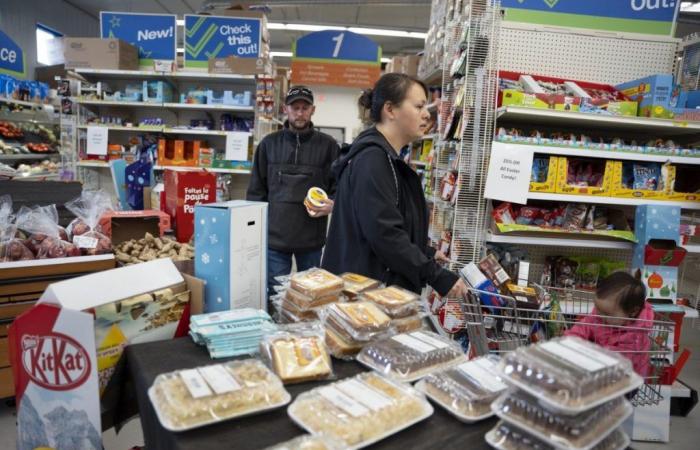SAINT JEAN — Rosie Harris, a mother who lives in a village where the cost of living is one of the highest in the country, believes that the prices of groceries are inhumane and that retailers pass profits before people’s fundamental right to food.
A blended family with seven children in Nain, Labrador’s northernmost village, Harris and her husband work three jobs between them: it’s the only way they can afford to feed the whole family, says -She.
Last winter, when they had only two sources of income, they regularly skipped meals so their children could eat, Ms. Harris admits.
She still feels anxious some mornings when she eats toast, as if she is taking something from her family.
“It was difficult to get back into a routine where you can have breakfast, dinner and even a snack. “It’s almost like I’m traumatized,” Ms. Harris testified in a recent interview.
“I don’t know how they can think these prices are acceptable.” Nain has a population of approximately 1200 and is one of five fly-in Inuit villages along the northern coast of Labrador. In 2021, the cost of food in Nain was the highest among remote communities in Canada’s North, where retail businesses are eligible for subsidies from the federal Nutrition North Canada (NNC) program.
The estimated cost of a basket of healthy food for a family of four in Nain jumped nearly 62% between 2011 and 2021, according to program data. This is the highest reported increase. This figure stands in stark contrast to other northern communities eligible for the subsidy, where the average price of food actually fell 2% over the same period, the data shows.
NNC subsidies aim to equalize food prices across the North and offset shipping costs to keep products affordable. But as Nain shows, that doesn’t always work, says Nicholas Li, an economist at Toronto Metropolitan University. “The factor that changes everything in this [programme] is that there is absolutely nothing stopping retailers from charging whatever price they want,” Mr. Li reported in a recent interview.
A limited offer
Nain has two stores where people buy groceries: Franks, which is owned by a Labrador-based company and has a limited selection, and the Northern Store, which is owned by the Winnipeg-based North West Company. Franks is known among Nain residents for having cheaper prices than Northern, but fewer offerings, Ms. Harris reported.
As an example of the price differences, she shared photos with The Canadian Press earlier this month showing a liter of Grand Pré brand 2% milk at $6.19 at Northern and $4.99 at Franks . Residents say the differences between the two stores suggest Northern is charging them too much.
Other residents shared photos from Northern showing a 3-pound cabbage costing $10.18, a two-pound package of black plums for $15.29 and a 4-gallon bottle of Crisco cooking oil at $21.49.
“It’s pure greed,” Ms. Harris concludes.
Conservative MP Lela Evans in a social media post earlier this month accused the two Northern Stores along the coast of price gouging and fueling food insecurity.
Darryl Martin, a spokesperson for the North West Company, said there were logistical challenges shipping to these communities.
“Prices reflect multiple factors, including transportation costs, wholesale and manufacturing prices, and our store overhead,” he wrote in an email. “We are constantly evaluating products to ensure we are providing our customers with healthy, affordable options for their everyday needs.”
Patty Dicker, owner of area Franks stores, said NNC subsidies have not kept pace with rising transportation costs.
Rethinking the NNC
The federal government is currently reviewing the program and Li said Ottawa should consider introducing price caps on products subsidized with public money.
The federal government should also consider helping to establish cooperatives or government-run stores, he added.
He gave as examples the Pilersuisoq state stores in Greenland and the Fédération des cooperatives du Nouveau-Québec, a network of cooperatives in Nunavik that provides grocery stores, hotels and even cable television.
“They are not managed in the same way as publicly traded companies that maximize their profits,” he said, noting that many cooperatives in Canada’s Inuit communities were created with help from the federal government. .
“The idea was that instead of just having Northern stores, which are descended from the same colonial company as the Hudson’s Bay Company, we should have more local owners,” Mr. Li said.
In the meantime, he pressed the Canadian government to make more data available on the prices retailers charge for products subsidized by the NNC program, so the public can hold companies accountable.
Ms Harris said those looking at the program should visit Nain and see the impacts of food prices. “If they could see, from my perspective, all these difficulties that all these families are facing,” she said. Sometimes we feel like we are relegated to second place because we are far away.”






